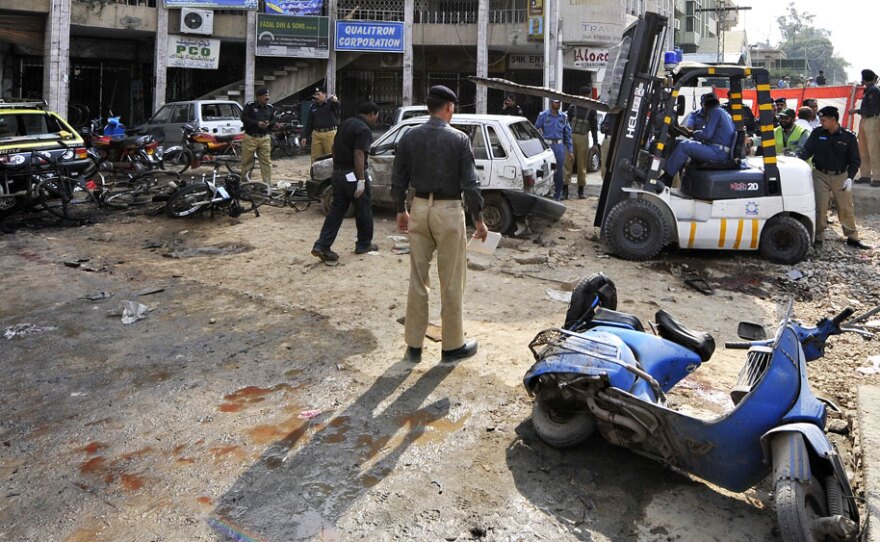In Pakistan, a suicide bomber struck the garrison town of Rawalpindi on Monday, killing at least 35 people and injuring 45 others. Soldiers were among the victims — a sign, authorities say, that the militants intend no letup in their campaign of retaliation against the army's operation to dislodge Taliban militants from their stronghold in South Waziristan.
In the past month, at least 10 major attacks in Pakistani cities have left more than 330 people dead. The violence, which has closed schools and terrorized the public, has intensified as the Pakistani army advances deeper into the tribal frontier region of South Waziristan.
The army says the first phase of the offensive, now in its third week, is complete. Briefing reporters, Pakistani army spokesman Maj. Gen. Athar Abbas said the second phase begins with the advantage of some tactical successes against the militants.
"Their defense system in the whole area has been broken," Abbas said, adding, "because of that, the militants are losing heart and suffering intense losses."
But the militant death toll is a fraction of the number of extremists the army has estimated are in South Waziristan. Of the 5,000 to 10,000 militants thought to be in the tribal enclave, the military claims to have killed 334.
The army acknowledges that no senior Taliban leader has been among those eliminated or captured. The government has announced a bounty of more than $600,000 for each of the three top Pakistani Taliban leaders.
Abbas was asked whether the months of well-publicized preparation for the offensive had allowed the militants time to flee the area. He downplayed that possibility and said that the militants were being "trapped" deeper inside South Waziristan.
"I cannot rule out somebody slipping out of the operational area. That is always a possibility. But what we know is that they are withdrawing, moving toward the heartland of this area, inside. There are also reports of going out, but not in a very great number," he said.
Abbas said three divisions of some 12,000 soldiers each are bearing down on the Taliban sanctuary from three directions, making escape difficult. He said that in the past 24 hours, government troops have advanced to the village of Kaniguram, which he called a "stronghold of resistance and terrorism."
While the army claimed steady progress in its battle to crush the Taliban, militants continued their withering attacks on the Pakistani public.
The bombing in Rawalpindi, which is just a few miles outside the Pakistani capital of Islamabad, occurred outside the National Bank of Pakistan where soldiers and civilians lined up to collect their monthly salary and pension payments.
Mohammad Usman was inside the bank at the time of the blast, cashing his paycheck.
"They were signing my check, and suddenly there was this loud explosion," Usman said. "We ran out, and I saw some 15 to 20 people sprawled on the ground," he said.
The bank is close to the army headquarters assaulted by militants last month. That attack was a severe blow to the army and a worrying demonstration of the militants' reach.
Fahim Asad, a chemistry teacher, came to see the aftermath of Monday's bombing. He said he despaired over the government's ability to protect the public.
"Being a Pakistani, I would like to ask why it happened, those innocent lives? Innocent lives sacrificed? Who's responsible?" he asked.
Hours after the Rawalpindi attack, a pair of suicide bombers drove to a police checkpoint on the outskirts of Lahore and detonated their explosives, killing themselves and wounding 16 others.
Copyright 2022 NPR. To see more, visit https://www.npr.org. 9(MDAzMjM2NDYzMDEyMzc1Njk5NjAxNzY3OQ001))







